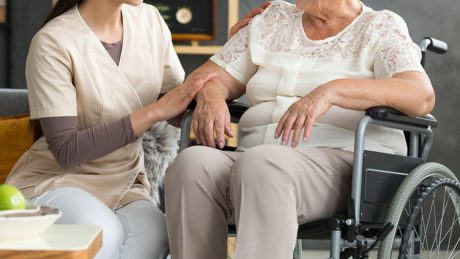The Coronavirus Act (the Act) came into force on 31 March 2020 as a result of the Covid-19 pandemic. The legislation expires in two years but is subject to six-monthly reviews by the government and may end earlier. Also, the Secretary of State can suspend provisions in the Act if they decide they are no longer necessary.
In this article, we look at the impact of the Act on healthcare providers and their patients.
Discharge
Ordinary hospital discharge processes will be suspended in favour of a default plan of ‘discharge home today’.
The idea is to expedite the safe discharge of patients from acute hospitals to free up beds as quickly as possible. At the point at which a patient is deemed safe and ready for discharge, the patient should be discharged the same day.
In the context of hospital discharge, the usual rules relating to a choice of accommodation will not apply. If a patient’s first choice of care home does not have a vacancy, the patient may be discharged to an alternative care home.
All support provided as a result of ‘discharge home today’ will be paid for by the NHS to ensure the focus is on moving patients from acute hospitals as soon as possible.
By ensuring the rapid discharge of individuals from hospitals, both clinical commissioning group (CCG) and local authority (LA) resources, which would otherwise be spent on undertaking multi-disciplinary team assessments, will be freed up to assist with the emergency.
NHS continuing healthcare assessments
The Act gives CCGs discretion to delay undertaking NHS continuing healthcare assessments until after the coronavirus emergency has passed.
This provision may increase uncertainty for individuals who would otherwise have had their future funding arrangements agreed sooner.
To mitigate the impact of this uncertainty and the impact on individuals’ finances, individuals who the CCG considers may be eligible for CHC funding will be directed towards NHS-funded discharge routes and assessed for CHC following the conclusion of the emergency. In other words, there will be no charge to the patient until it possible for an NHS continuing healthcare assessment to be completed.
Local authority care
Where a patient is being discharged into a care home or other care setting funded by the LA, the duties imposed on the LA by the Care Act 2014 could be temporarily relaxed as a result of provisions in the Act.
LAs should do everything they can to continue to meet their existing duties prior to the legislation coming into force. If they are unable to do so, they must be streamline present assessment arrangements and prioritise care so that the most urgent and acute needs are met.
Under the Act:
- The LA may lawfully prioritise who and what type of needs it will meet, rather than being required to meet all eligible assessed needs as specified under the Care Act 2014.
- The LA may lawfully determine whether and the extent to which it will carry out assessments of individuals’ needs or review care plans or carry out financial assessments, rather than being required to carry these out in all cases.
- The Act also reserves the right for the LA to retrospectively complete a financial assessment once the emergency period is over, and backdate the charges to the individual in respect of any social care provided.
Applying for welfare benefits
Many patients may need to apply for welfare benefits once discharged. With a higher number of discharges, it is important they are aware of the impact of the Act on the Department for Work and Pensions’ (DWPs) processes.
We’ve summarised the changes below, but please read our previous article for further information.
In light of the current coronavirus outbreak and the government’s guidelines against all non-essential travel, the DWP has temporarily suspended all face-to-face assessments for health and disability-related benefits.
Patients who are in the process of applying for these benefits will be contacted shortly by telephone or letter to let them know what will happen next. Some of our clients have recently had telephone interviews in place of face-to-face interviews.
Universal Credit and Employment & Support Allowance
As many workers may find themselves redundant or furloughed as a result of the pandemic, applications for Universal Credit and Contributory Employment & Support Allowance (ESA) have more than doubled. So as not to put a strain on resources, the DWP no longer requires new applicants to provide evidence to start a claim.
Applications for Universal Credit and can receive up to a month’s advance payment upfront without attending a jobcentre.
The usual seven waiting days for new ESA claimants will not apply. ESA will be payable from day one.
Statutory Sick Pay (SSP)
SSP may now be claimed on the first day of incapacity rather than after four days of illness.
It has also been extended to those who are quarantined or self-isolating due to coronavirus either because they have symptoms or because they live with someone who has symptoms or because they are following the direction of a medical professional or government guidance.
Self-employment Income Support Scheme (SEISS)
The SEISS will support self-employed individuals (including members of partnerships) whose income has been negatively impacted by coronavirus. The scheme will provide a grant to self-employed individuals or partnerships of 80% of their profits up to a maximum of £2,500 per month.
This article was written by our paralegal Grace Horvath-Franco
We are here to help
In these difficult times, the concerns of our pro bono clients are likely to be more stark than those in more fortunate circumstances. The Legal Service will available throughout the crisis to help in any way we can to ease the burden on our clients.
This article was published as part of ‘The Legal Service Newsletter’. The Legal Service is provided by Stewarts’ pro bono team as part of the firm’s commitment to help people with serious injury. The service offers free advice to patients when they need it most.
To make a referral to The Legal Service, please contact Kara Smith by phone on 020 7822 8000 or by email at ksmith@stewartslaw.com.
Subscribe – In order to receive our news straight to your inbox, subscribe here. Our newsletters are sent no more than once a month.
Covid-19 is impacting individuals and companies around the world in an unprecedented way. We have collected insights here to help you navigate the key legal issues you may be facing at this time.
You can find further information regarding our expertise, experience and team on our Personal Injury pages.





